English CBSE Class 10 NCERT First Flight Chapter 7 Glimpses of India Free Solution of Extra Questions and Answers – Extract Based Questions Short Answer Questions Long Answer Questions and Value Based Questions
GLIMPSES OF INDIA
I
A BAKER FROM GOA
(Extra Questions)
Extract Based Questions


1. Which ‘family profession’ is being referred to in the above extract?
2. Which word in the extract mean ‘announcing’?
3. By what nickname bakers are known in Goa?
4. According to author, to which country the lovers of bread belonged to?
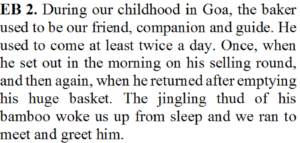

1. Why did kids run to meet the baker?
2. How was a baker regarded during those times?
3. Which phrase in the extract means ‘to start’?
4. How many times did the baker come every day?
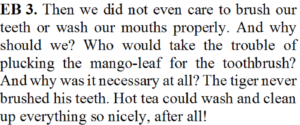

1. What was considered a good method of brushing teeth?
2. What were kids supposed to use for brushing their teeth?
3. Which word in the extract means ‘effort’?
4. What did baker bring for kids?
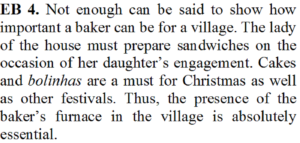

1. What should be prepared on engagement of a girl?
2. What should be prepared on festivals?
3. Which word in the extract is synonym of ‘very necessary?
4. What is the name of the dress worn by bakers during Portuguese days?
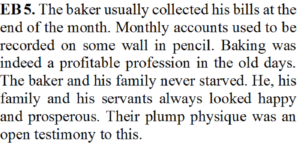

1. When did baker usually collect his payments?
2. Which word in the extract mean ‘certainly’?
3. Where were monthly accounts written?
4. How can one say that baking was a profitable business?
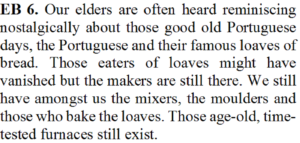

1. What do elders often think about?
2. How can you infer that bread making still exists in Goa?
3. Which word in the extract mean ‘disappeared’?
4. How are bakers known in Goa today?
Short Answer Questions (30-40 words)


Answer: The baker made his musical entry with the ‘jhang, jhang’ sound of his specially made bamboo staff. One hand supported the basket on his head and the other banged the bamboo on the ground. He greeted the house lady by saying Good Morning.


Answer: The author states that the time tested furnaces are still there. The fire of furnace has not yet extinguished. He further says that the son still carries the family profession of bread making.
Thus bakers still exist in Goa.


Answer: On almost every occasion some variety of bread was required. During engagement sandwiches, during marriage bol, during Christmas and other festivals cakes and bolinhas were required.
Hence baker’s furnace was essential.


Answer: During Portuguese days bakers wore a single piece frock like dress that used to reach up to knees. It was called Kabai.
Latter they started wearing a shirt and a short trousers shorter than full length but that reached up to below their knees. This was known as ‘pader’.


Answer: Elders in Goa are nostalgic about good old Portuguese days, the Portuguese and their famous loaves of bread.


Answer: The baker, his family and his servants looked happy and prosperous. Their figure was plump like.
Above statements are a testimony that bread making was a profitable business.


Answer: Baker made a musical entry with the ‘jhang, jhang’ sound of especially made bamboo staff. Kids would run to him to get some bread bangles.
Kids would climb on the parapet or a bench to peep into the basket of baker. After delivering bread to servants, baker used to give bread bangles to kids.
Long Answer questions (120-150 words)


Answer: During childhood of author, the baker used to be their friend, companion and guide. He used to come twice every day. First in the morning to deliver bread and again latter during the day after selling all his bread.
Baker made a musical entry with the ‘jhang, jhang’ sound of especially made bamboo staff. Kids would run to him to get some bread bangles. Kids would climb on the parapet or a bench to peep into the basket of baker. After delivering bread to servants, baker used to give bread bangles to kids.
The accounts were maintained by writing on some wall in pencil. The baker collected his payments once in a moth.
During childhood of author, bakers used to wear a shirt and trousers that was shorter than full length. The baker was also called as a ‘pader’.
****
II
COORG
(Extra Questions)
Extract Based Questions
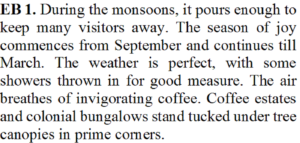

1. Which is the best season for tourist?
2. Which two word in the extract mean ‘rains’?
3. Which area of our country is being talked about in the above extract?
4. Which crop has large estates in the area under reference?
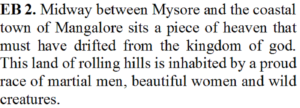

1. In which state of India Coorg is situated?
2. What type of animal are inhabited in hills of Coorg?
3. Which phrase in the extract means ‘series of hills’?
4. Why it is mentioned that Coorg is a piece of land that has drifted from kingdom of god?
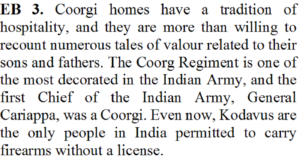

1. Who was the first chief of Indian Army?
2. What special permission people of Coorg have even today?
3. What kind of stories people of Coorg are always ready to tell.?
4. Which word in the extract means ‘several’?
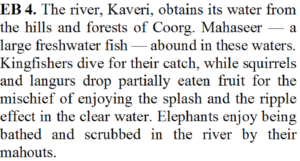

1. Which river flows through Coorg?
2. Why do langurs drop partially eaten fruits in water?
3. Which word in the extract is synonym of ‘found in large quantity?
4. What do elephants enjoy?
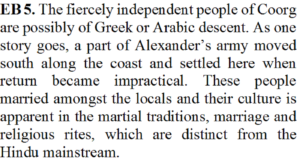

1. What is said about descent of people of Coorg?
2. Why did a part of Alexander’s army settle in Coorg?
3. Which aspects show that their culture is different from those of locals?
4. Which word in the extract is synonym to ‘visible’?
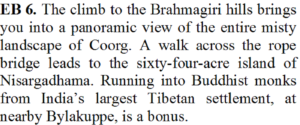

1. Where is the largest settlement of Tibetan in India?
2. What can one see from Brahmagiri hills?
3. Which word in the extract mean ‘additional benefit’?
4. What is the area of Nisargdham island?
Short Answer Questions (30-40 words)


Answer: The Coorg Regiment is one of the most decorated regiment of Indian Army.
People of Coorg have the permission to carry firearms without license.
Recognition of bravery is made through above two facts.


Answer: People are thought to be of Greek or Arabic descent
A part of Alexender’s army settled there because return had become impractical.
People of Coorg wear a long black coat with an embroidered waist-belt ‘kuppia’. This is similar to ‘kuffia’ worn by Arabs.


Answer: Coorg is a beautiful green place having rolling hills. It is full of wildlife and aqua life. Adventure sports like river rafting, canoeing, rappelling, rock climbing, mountain biking and trekking are available.
Coffee estates, spice plantations and visit to Buddhist monks are additional attractions.


Answer: Coorg is the smallest district in Karnataka. It is situated midway between Mysore and Mangalore.
It is famous for its greenery, wild life, aqua life, adventure sports & coffee and spice plantations. Settlement of Budhist monks is an additional feature.
Long Answer questions (120-150 words)


Answer: Coorg is situated midway between Mysore and Mangalore. It is the smallest district of Karnataka.
It has beautiful scenic views. About thirty percent of its area is covered by evergreen rainforests. It is full of greenery, aqua life and wild life. The rolling hills present a panoramic view of entire misty Coorg.
Majestically flowing Kaveri river is full of aqua life. One can see several birds, squirrels, fish and langur along it.
Adventure sports like river rafting, canoeing, rappelling, rock climbing, mountain biking and trekking are available.
Coffee estates and spice plantations are another attractions for tourists.
A large island named Nisargdham is a beautiful island in Coorg. The biggest settlement of Buddhists monk at Bylekuppe is a bonus for tourist seeking soul and heart of India.
Thus Coorg offers various attractions for tourists. The best period to visit is from September to March.


Answer: Coorg is the smallest district of Karnataka state of India.
The evergreen forests of Coorg account for about 30 percent of the area. Coorg has large plantations of coffee and spices. Palatial bungalows of British era are situated at prime locations and in the coffee plantations.
People of Coorg are very brave. People from almost every family have served in Indian Armed Forces. The Coorg Regiment of Indian Army is the most decorated regiment.
Coorg has many attractions for tourist like rafting, rappelling, rock climbing, mountain biking and walking trails along mountains. One can see several birds, insects, animals and waterfalls in Coorg. The best season to visit Coorg is from September to March.
Bylakuppe near Nisargdham island has the largest population of Tibetan monks in India. It provide a good opportunity for people who believe in meditation.
Thus Coorg is full of natural beauty. It is a preferred destination for tourists.
****
III
TEA FROM ASSAM
(Extra Questions)
Extract Based Questions


1. How many cups of tea are drunk every day?
2. Which word in the extract mean ‘more than’?
3. Where were two boys when this conversation was made?
4. Who was selling tea?
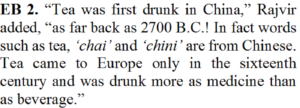

1. How is medicine different than a beverage?
2. In which country was tea first consumed?
3. Which phrase in the extract means ‘actually’?
4. At which station two boys got down?
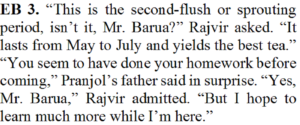

1. What is the period of second flush for tea leaves?
2. Where were the two boys while this conversation took place?
3. Why was Mr Barua surprised?
4. Which word in the extract means ‘agreed’?


1. What could be seen as far as eyes could see?
2. Why were tea bushes looking dwarfed?
3. What were the doll-like figures?
4. Which word in the extract is synonym of ‘strong’?
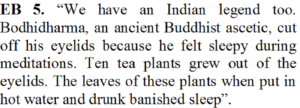

1. Who is speaker of above extract?
2. Why did Bodhidharma cut off his eye lids?
3. Which word in the extract mean ‘expelled’?
4. Who was Bodhidharama?
Short Answer Questions (30-40 words)


Answer: Rajvir and Pranjol were going to a tea plantation. Pranjol’s father was manager there. Panjol had invited Rajvir during their summer vacations.


Answer: There are lot of tea garden in Assam. Assam produces largest quantity of tea in the world. Tea produced here is supplied all over the world. Hence Assam is called a tea country.


Answer: Rajvir had collected several information about tea and tea gardens before coming to Assam. He knew about history of tea and its sprouting seasons. Hence Mr. Barua said that Rajvir had done his homework before coming there.


Answer: On both sides of the gravel-road were acre upon acre of tea bushes, all neatly pruned to the same height. Groups of tea-pluckers, with bamboo baskets on their backs, wearing plastic aprons, were plucking the newly sprouted leaves.


Answer: A Chinese emperor always used to drink boiled water. One day a few leaves of the twigs burning under the pot fell into the water giving it a delicious flavour. It is said they were tea leaves.


Answer: Bodhidharma was an ancient Buddhist monk. He felt sleepy during meditation so he cut off his eyelids and threw on the ground. Ten tea plants grew out of the eyelids.
Long Answer questions (120-150 words)


Answer: In the train he informed Pranjol that over eighty crore cups of tea are consumed everyday all over the world. Rajvir narrated that Assam has the largest concentration of tea plantations in the world.
Then he narrated the two legends about discovery of tea. He recited history of tea saying that tea was drank in China as far back as in 2700 BC. Words like ‘chai’ and ‘chini’ have come from Chinese language. Tea came to Europe in 16th century. Tea was first consumed there for medicine purpose rather than as a beverage.
While travelling in the car to Dhekiabari Tea Estate, Rajvir talks about the second flush or sprouting of tea leaves. He also mentions about its time period and quality of leaves.
Thus we can conclude that Rajvir had certainly read a lot about tea and tea gardens before commencement of his journey.
****
THE TREES
(Extra Questions)
Extract Based Questions
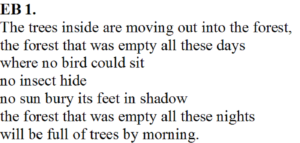

1. What does the poet mean by empty forests?
2. How will forest be full by the morning?
3. Why birds cannot sit and insects cannot hide?
4. What is the poetic device used in ‘no sun bury its feet in shadow’?
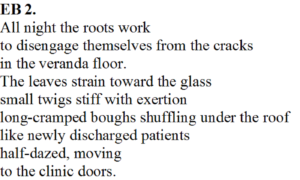

1. What do roots do all night?
2. What are the boughs compared to?
3. Why do twigs get stiff?
4. Which poetic device is used in ‘like newly discharged patients’?
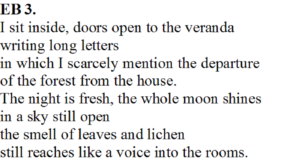

1. What does poet not mention in her long letters?
2. How is smell of leaves and lichen compared with?
3. Which poetic device is used in ‘writing long letters’?
4. Which word in the extract means ‘hardly’?
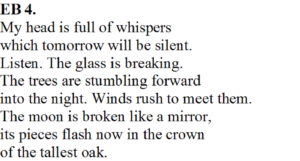

1. Why whispers would be silent tomorrow?
2. Why trees are stumbling?
3. Which poetic device is used in ‘the moon is broken like a mirror’.
4. Which word in the extract is synonym of ‘shine’?
Short Answer Questions (30-40 words)


Answer: Theme of the poem is the conflict between man and nature. Man had destroyed nature for its own greed and comfort. It has resulted into ecological imbalance and global warming. Man brought plants into his house. These want to move in the open to support the nature.


Answer: Initially there are no trees in the forests. So one can see the whole moon.
Later, trees move out in the forest. So the moon in not completely visible. It is described like broken pieces of mirror.


Answer: Roots of trees are trying to grow through cracks of veranda. Twigs and leaves are pressing against the glass. The bough are cramped at the ceiling of the house. Twigs have become stiff. Boughs are confused like a newly discharged patient.


Answer: Poet is very optimistic that damage caused by human beings to the nature would soon be corrected. Poet feels that movement of plants into the empty landscape should be done by human beings in their own interest. And very soon there could be greenery everywhere.


Answer: Boughs are in the house which is not their natural abode. They feel restricted in the closed space and want to move out in the open.
A patient in the hospital feels suffocated and wants to move to his house.


Answer: These are whispers of silent struggle going on in her house. The roots of trees are trying to grow through cracks of floor. Twigs and leaves are pressing against the glass panes of window. Boughs are shuffling along the ceiling.
Long Answer questions (120-150 words)


Answer: During beginning of the poem, poet says that there are no trees in the forest. It means that all the trees in the forest have been cut. Now though the area is still called a forest but it has no trees.
Owing to absence of trees in the forest, there is no animal life present there. The ecological balance is disturbed.
In the poem, poet says that sun cannot find shadows in the forest. Through this line, she is indicating the situation of global warming. Another ill-effect of deforestation.
By indicating the efforts made by roots, twigs and boughs, poet wants to say that it would require lot of efforts to replant trees in empty forests.
She presents optimism through the movement of tress from house to forest.
****


0 Comments